Latest Climate Change reports
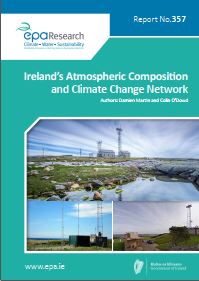
Research 357: Ireland’s Atmospheric Composition and Climate Change Network
Authors: Damien Martin and Colin O’Dowd, November 2020
Year: 2020
The Atmospheric Composition and Climate Change network is a valuable established national research and monitoring infrastructure. This fellowship has enabled and sustained scientific work on a national monitoring network. Infrastructure has been continually developed over the course of the fellowship that will facilitate long-term sustainable measurements.
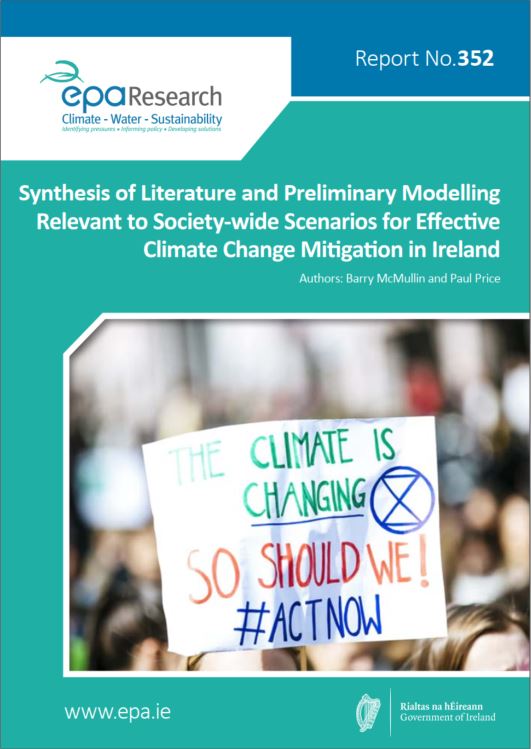
Research 352: Synthesis of Literature and Preliminary Modelling Relevant to Society-wide Scenarios for Effective Climate Change Mitigation in Ireland
Authors: Barry McMullin and Paul Price, November 2020
Year: 2020
Rapid global warming due to emissions of greenhouse gases (GHGs) caused by human activities is negatively affecting global climate and ecological systems. This research assesses the international literature to inform climate mitigation policy in Ireland and provides a preliminary tool for comparing policy within the Paris Agreement commitments.
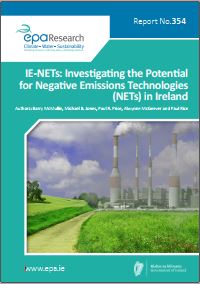
Research 354: IE-NETs: Investigating the Potential for Negative Emissions Technologies (NETs) in Ireland
Authors: Barry McMullin, Michael B. Jones, Paul R. Price, Alwynne McGeever and Paul Rice, November 2020
Year: 2020
It is now scientifically understood that effective climate action sets a finite limit on total future net emissions of carbon dioxide (CO₂) from human activities, and may require dependence on large-scale “negative emissions” or CO₂ removal from the atmosphere. The IE-NETs project provides the first review of the technical potential for CO₂ removal in Ireland and an assessment of the security of long-term carbon storage.
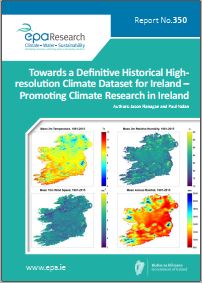
Research 350: Towards a Definitive Historical High-resolution Climate Dataset for Ireland – Promoting Climate Research in Ireland
Authors: Jason Flanagan and Paul Nolan, October 2020
Year: 2020
There is strong and constant demand from various sectors for long-term, high-resolution gridded climate datasets. This report describes the available datasets and how, using a variety of available observational datasets, appropriate uncertainty estimates and skill scores have been calculated for the model outputs.
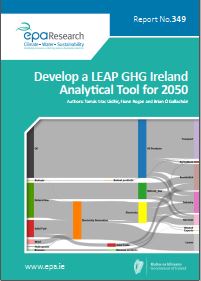
Research 349: Develop a LEAP GHG Ireland Analytical Tool for 2050
Authors: Tomás Mac Uidhir, Fionn Rogan and Brian Ó Gallachóir, October 2020
Year: 2020
This report describes a greenhouse gas (GHG) emissions model of Ireland’s energy and agriculture sectors, which were responsible for approximately 61 million tonnes (Mt) of GHG emissions in 2017. The Low Emissions Analysis Platform (LEAP) software was used to build the LEAP Ireland 2050 model, which simulates the development of future possible decarbonisation pathways for Ireland.
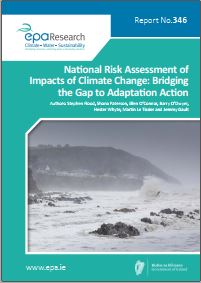
Research 346: National Risk Assessment of Impacts of Climate Change: Bridging the Gap to Adaptation Action
Authors: Stephen Flood, Shona Paterson, Ellen O’Connor, Barry O’Dwyer, Hester Whyte, Martin LeTissier and Jeremy Gault, October 2020
Year: 2020
Ireland’s climate is changing in line with global trends and this trend is expected to continue. This report presents its findings according to the NAF’s four themes: natural and cultural capital, critical infrastructure, water resources and flood risk management, and public health. The impacts of climate change will have direct relevance to the achievement of planning and development objectives and priorities within these themes.
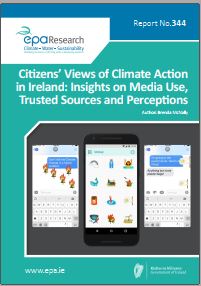
Research 344: Citizens’ Views of Climate Action in Ireland: Insights on Media Use, Trusted Sources and Perceptions
Author: Brenda McNally, September 2020
Year: 2020
As the physical impacts of climate change become more urgent and the subject of wider public concern, greater understanding of the societal responses will be needed. This project investigated citizens’ views of and media consumption about climate actions in Ireland. The report supports environmental policymaking by providing data to tailor communication about climate action and to broaden citizen engagement with climate change.
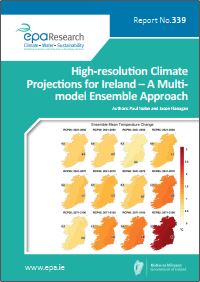
Research 339: High-resolution Climate Projections for Ireland – A Multi-model Ensemble Approach
Authors: Paul Nolan and Jason Flanagan, September 2020
Year: 2020
In this study, regional climate models were employed to dynamically downscale the coarse information of Global Climate Models to provide detailed projections of 21st-century regional climate change in Ireland. The projections were run at high spatial resolution (4 km grid spacing), allowing a more accurate evaluation of the local impacts of climate change.

Research 338: Greening Transport: Final Report
Authors: Brian Caulfield, Paraic Carroll, Shreya Dey, Bidisha Ghosh and Aoife Ahern, August 2020
Year: 2020
The Greening Transport project examined the behavioural response of commuters within the Greater Dublin Area, to a range of policy incentives to encourage travellers to make greater usage of sustainable travel modes for trips to places of work or education. The results suggest that policy incentives alone could lead to tangible improvements in commuting time and cost constitute valuable guidance and recommendations for policymakers.
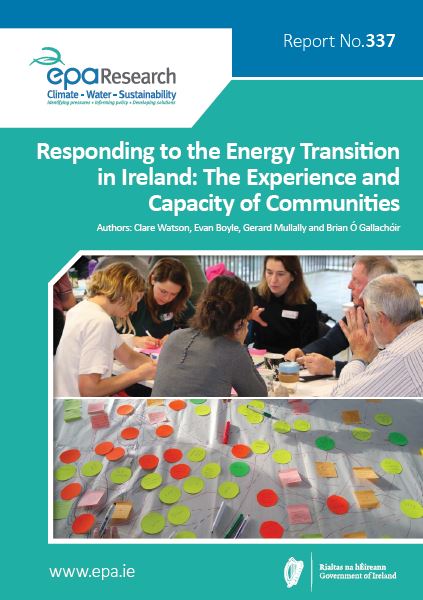
Research 337: Responding to the Energy Transition in Ireland: The Experience and Capacity of Communities
Authors: Clare Watson, Evan Boyle, Gerard Mullally and Brian Ó Gallachóir, August 2020
Year: 2020
Recently, Ireland has witnessed a significant increase in interest in and policy focus on the role of citizens and communities in the energy transition to a low-carbon future. This research project has engaged with community energy groups over a 3-year period and investigated how we might support the development of community capacity to effectively engage in energy transitions.

Research 331: IMPLiCIt: IMProving inversion modeL Capability in Ireland
Authors: Colin O’Dowd, Damien Martin and Dèlia Arnold, July 2020
Year: 2020
The IMPLiCIt project aims to develop a combined measurement and modelling system to verify methane sources over Ireland and regions affecting the Irish domain, and to improve Irish national capacities to estimate and verify national methane and other greenhouse gas (GHG) emissions inventories.
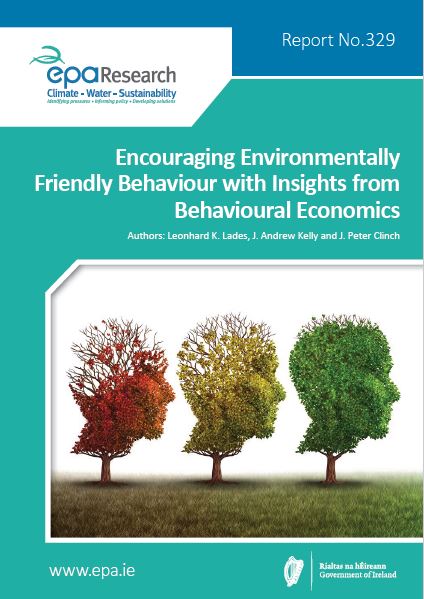
Research 329: Encouraging Environmentally Friendly Behaviour with Insights from Behavioural Economics
Authors: Leonhard K. Lades, J. Andrew Kelly and J. Peter Clinch, July 2020
Year: 2020
The 2019 Climate Action Plan sets out targets for Ireland in sectors including transport, residential heating and waste. To achieve these targets, infrastructure investments are essential. However, infrastructure investments are not enough, the investments must be paired with broad behavioural change. This report aims to support environmental policymaking in Ireland with the goal of encouraging environmentally friendly behaviour.
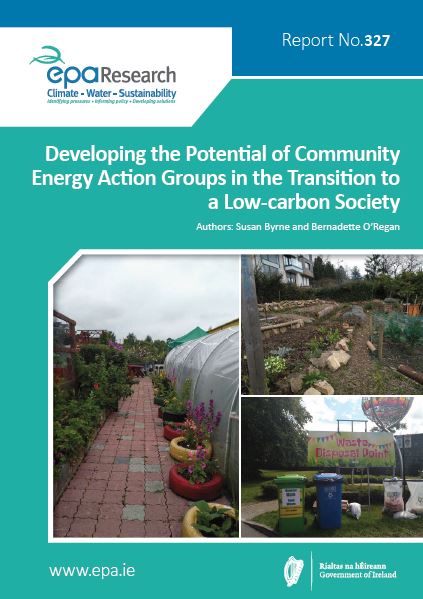
Research 327: Developing the Potential of Community Energy Action Groups in the Transition to a Low-carbon Society
Authors: Susan Byrne and Bernadette O’Regan, July 2020
Year: 2020
In Ireland, approximately 38% of the population live in rural regions. Rural populations contribute significantly more to carbon dioxide equivalent emissions in the transport and residential energy sectors than their urban counterparts. In relation to community sustainability, this report evaluates the opportunities for rural communities in low-carbon transition in relation to energy, waste, transport and other contributing factors.

Research 326: The Role of Energy Technology in Climate Mitigation in Ireland: Irish TIMES Phase 3
Authors: Brian Ó Gallachóir, Paul Deane, James Glynn, Fionn Rogan, July 2020
Year: 2020
The continued rise in transport activity, energy consumption and emissions can be attributed to economic, technological and societal factors. A range of technoeconomic and socioeconomic analytical tools and models were developed and employed in this project to generate an evidence base that can inform decarbonisation-focused transport sector decision-taking and policymaking.
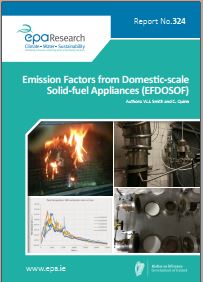
Research 324: Emission Factors from Domestic-scale Solid-fuel Appliances (EFDOSOF)
Authors: W.J. Smith and C. Quinn, July 2020
Year: 2020
The Emission Factors from Domestic-scale Solid-fuel Appliances (EFDOSOF) study set out to establish representative, real-world emission factors (EFs) for the range of solid fuels used for residential combustion in Ireland. The improved EFs developed during this study will inform and improve Ireland’s response to the UNECE Convention on Long-range Transboundary Air Pollution and to the EU National Emission Ceilings Directive.
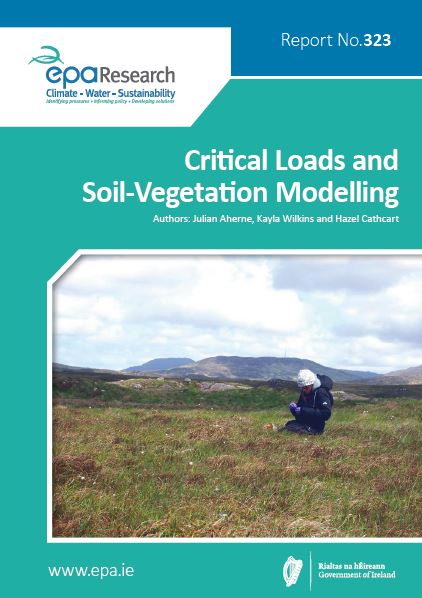
Research 323: Critical Loads and Soil-Vegetation Modelling
Authors: Julian Aherne, Kayla Wilkins and Hazel Cathcart, July 2020
Year: 2020
This report presents results from the research project “Critical Loads and Soil-Vegetation Modelling”. The principal objectives of this project were to update critical loads of acidity and eutrophication for terrestrial and aquatic ecosystems in Ireland, to evaluate the potential impacts of nitrogen deposition on plant species diversity.
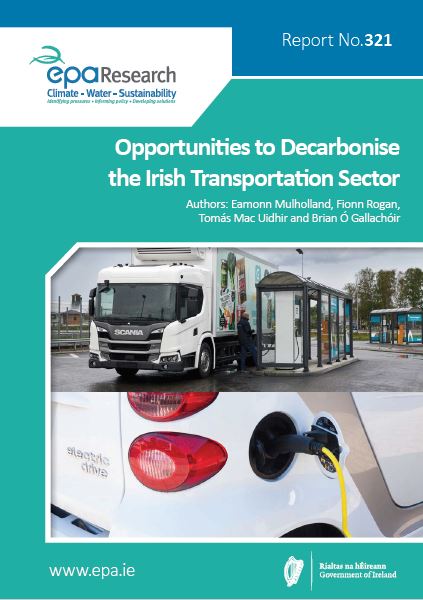
Research 321: Opportunities to Decarbonise the Irish Transport Sector
Authors: Eamonn Mulholland, Fionn Rogan, Tomás Mac Uidhir and Brian Ó Gallachóir, July 2020
Year: 2020
In 2017, the energy sector was responsible for 60% of Ireland’s greenhouse gas (GHG) emissions. The largest contributor to Ireland’s energy-related GHG emissions, at 33%, is the transport sector. A range of technoeconomic and socioeconomic analytical tools and models were developed and employed in this project to generate an evidence base that can inform decarbonisation focused transport sector decision-taking and policymaking.

Research 320: Assessing Vulnerability to Climate Change: An Approach Illustrated through Large Urban Scale Adaptation (Urb-ADAPT)
Authors: Roberta Paranunzio, Barry O’Dwyer, Paul J. Alexander, Marco Guerrini, Ned Dwyer and Jeremy Gault, July 2020
Year: 2020
Globally, climate change will have wide-ranging effects on all aspects of society, the environment and the economy. This is particularly the case for urban areas, which represent only a small fraction of the Earth’s surface (less than 3%) but are where more than half of the global population resides and concentrations of assets and economic activities are found.

Climate Research Coordination Group: Second Report on Activities: January - December 2019
Authors: This report has been prepared by the EPA on behalf of the Climate Research Coordination Group, May 2020, June 2020
Year: 2020
This second report presents a summary of the Climate Research Coordination Group’s activities in 2019.

Research 315: Activity Data for Emissions of Non-methane Volatile Organic Compounds
Authors: Stephen Barry and Bernadette O’Regan, April 2020
Year: 2020
Non-methane volatile organic compound (NMVOC) emissions from Solvent and Other Product Use have been estimated for 2006–2012. This included updating the activity data, emission factors and emissions data and compiling this information into a national emissions estimate for the specified years.